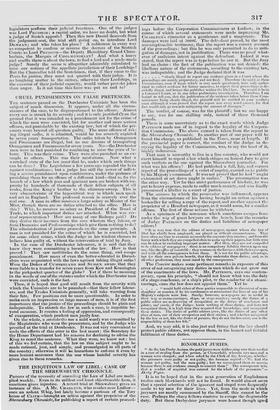CRUEL PUNISHMENTS ON FALSE PRETENCES.
THE sentence passed on the Dorchester Unionists has been tho subject of much discussion. It appears, under all the circum- stances of the case, to be disproportioned to the offence. Almost every one is struck by its severity; and it is only justified (!) on the
ground that it was intended as a punishment not for the crime of which the men were convicted, but for another and more serious offence, not punishable by the existing law, but of which the pri-
soners were beyond all question guilty. The mere offence of tak- ing illegal oaths, it is admitted, would be too severely expiated by seven years transportation. The oaths taken by Orangemen and Freemasons are illegal, but no one dreams of transporting Orangemen and Freemasons for seven years. No—the Dorchester men were in fact punished for combining to raise the price of la- bour. This was their crime. They were also punished as an ex- ample to others. This was their misfortune. Now what a wretched state of the law must that be, under which such things can be done ? The Legislature a few years ago repealed the laws against combinations ; but a judge has still the power of inflict- ing a severe punishment upon combinators, under the pretence of punishing them for an offence of a different kind—that is, for the breach of a law which poor and ignorant men see broken with im- punity by hundreds of thousands of their fellow subjects of all ranks, from the King's brother to the chimney-sweep. This is very characteristic of the hypocritical way in which men speak and act in England. The professed reason is scarcely ever the real one. A man in office receives a large salary as Master of the Mint, though there arc no duties attached to the office. How is this ? Why, he receives no salary as President of the Board of Trade, to which important duties are attached. What was vir- tual representation ? How are many of our Bishops paid ? Do they derive their incomes from the sees wherein they labour, or from Deaneries and Professorships which give them nothing to do? The administration of justice proceeds on the same principle. A .man is not punished for the crime of which he is convicted, but for some other crime, which the Judge in his wisdom chooses to believe him guilty of, without the intervention of trial by Jury.
In the case of the Dorchester labourers, it is said that they knew they were committing a breach of the law. How is that proved ? They saw multitudes do the same thing, and escape punishment. How many of even the better-educated in Dorset- shire were acquainted with the laws against taking illegal oaths? Were the Dukes of CUMBERLAND and SUSSEX aware that they were liable to a transfer for seven years from Kew and Kensington to the pickpocket quarter of the globe? Yet if there be meaning in the words of one of the statutes under which the Dorchester men were convicted, such is the fact.
Then, it is hoped that good will result from the severity with which the Unionists are to be punished—that their fellow labour- ers, and the Trades Unionists generally, will take warning from their fate. Few positions can be more questionable. In order to make such an impression on large masses of men, it is of the first importance that the justice of the proceedings should be plain and indisputable. To stretch the law in such a case, is impolitic be- yond measure. It creates a feeling of oppression, and consequently of exasperation, which prudent men justly fear.
On the whole, a mistake (to use a mild word) was committed by the Magistrates who were the prosecutors, and by the Judge who presided at the trial at. Dorchester. It was not very convenient to undo the effects of this error in the last resort : the Secretary for the Home Department had his reasons for declining to advise the King to remit the sentence. What they were, we know not : but of this we feel certain, that the law on this subject ought to be made rational, just, and simple, and promulgated in all parts of the country ; otherwise it will lee hazardous to enforce it even by more lenient sentences than the one whose hateful severity has given rise to these remarks.
















 Previous page
Previous page